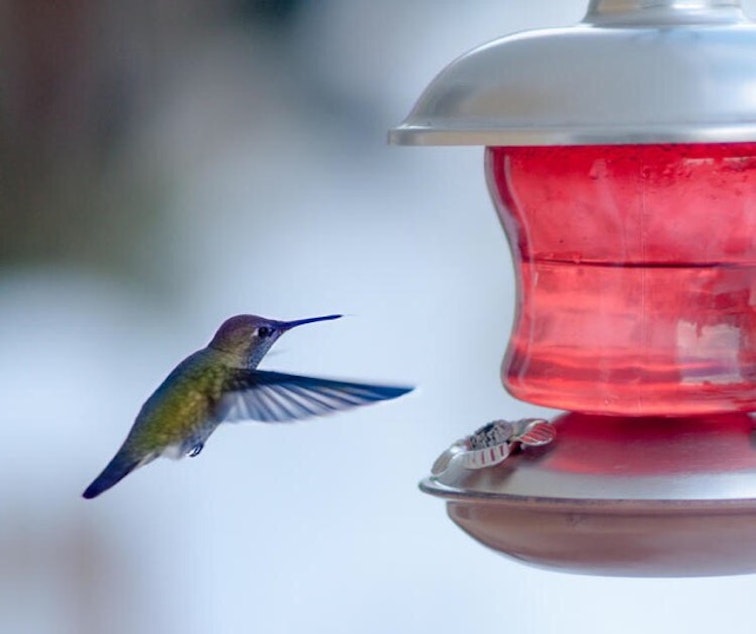Temps drop and Seattle panics: What about the hummingbirds?!

This story was originally published on February 10, 2019. Scroll down for an update.
Items in hot demand this snowpocalypse: shovels, bananas, marijuana and …
… electric warmers for hummingbird feeders.
“We’ve been getting 10 calls a day about hummingbirds and the cold,” said Melissa Melloy, assistant manager of the Seattle Audubon Nature Shop. “They call saying, ‘I’m worried about my hummingbirds,’ ‘Do you sell heaters?’ … asking if the birds are going to be okay.”
The Western Washington Birders group on Facebook was also alight with anxiety: where to find the last box of Hummer Hearth warmers, or, failing that, how to jerry rig a heater with Christmas lights so that the nectar doesn’t freeze. (Scroll down for tips.)
When Seattleites talk about hummingbirds in winter, they mean the Anna’s hummingbird, which lives here year-round. The Anna’s hummingbird is native to the area and has a long tongue and talons that look like teensy slivers. The males have glittery pink gorgets and head feathers the color of sunset. They are, to quote Melloy, enchanting creatures.
See an Anna's hummingbird on our Instagram
Low temperatures lure them indoors, which is where Alexis Ortega of Seattle found one this week, making a racket in the stairwell of her apartment complex in the city's Wedgwood neighborhood.
Sponsored
“I heard this noise that sounded like a lawn mower or a leaf blower,” Ortega said. “I was like, what is going on? Because there is snow on the ground, who would be using a leaf blower?”
It was a hummingbird in a tizzy, trying to get out. Then, thunk, the bird fell into a box on a shelf. Ortega saw that the bird was tangled in cobwebs. She carried it into her bathroom, where she used tweezers to pull the cobwebs off one wing.
When the bird held out its other wing, she wondered if it was hurt. Upon closer inspection, she noticed more cobwebs. “It was waiting for me to clean it off,” Ortega said. “I was amazed.”
Ortega released the hummingbird out her window, and then stepped outside to make sure it was okay. She saw two hummingbirds in a tree, chirping loudly.
“I felt like they were chirping at me to thank me for helping it out,” she said. (This is not human fantasy, it turns out; hummingbirds are believed to recognize human faces.)
Sponsored
This experience made Ortega want to clean the cobwebs from her stairwell, but she read that hummingbirds eat spiders and bugs for protein. Nectar is good for quick energy, but they need more than sugar water.
In the Western Washington Birders Facebook group, Peggy Hanson shared her own heartwarming hummer tale. Looking at her feeder, she saw two hummingbirds and thought they were mating. They were not: one had fallen into the well of the feeder, and the other appeared to be trying to rescue her. (Or trying to kill her; there was debate about this.)
Hanson said on Facebook that she brought the feeder inside, where it warmed up enough for the bird to get out.
She said she then drove the bird to a rescue facility where the hummingbird was nursed back to health. Hanson wrote an update on Saturday afternoon: The female hummingbird was thriving and would be released to her backyard after this cold snap.
Update 2/10/2021: A detail I didn't want to share with you years ago, because it was so demoralizing, is that hummingbirds' tiny tongues will stick to frozen feeders, and they will die. Juan Chiquiza, our social media strategist, asked me to include this detail, saying, "We can save hummingbird lives." I hope I didn't ruin your snow day.
Feeder heaters: for sale and DIY (tips via Melissa Melloy and members of Western Washington Birders Facebook group)
- Buy a feeder heater from the Seattle Audubon Nature Store in Wedgwood, in northeast Seattle, for $26.95.
- Wrap Christmas lights (non-LED, because they need to transmit heat) around a hummingbird feeder to keep the nectar from freezing.
- Wrap the feeder in bubble wrap or an ace bandage or a thick nylon baseball stirrup sock with bubble wrap.
- Point a work light at the feeder to keep it warm. One commenter said a hummingbird took a snooze on the feeder because of the warmth.
- Put a straw around the metal hanger or wrap it in tape so the hummingbird's tongue doesn't get stuck to the metal surface.




